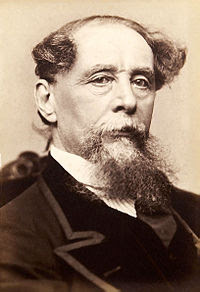 |
| Charles Dickens |
All-purpose adjectives
At several points in the book, Dickens chooses a single adjective to describe many facets of a scene or a newly introduced character. Here is one example: "The park was delightful, the punch was delightful, the dishes of fish were delightful, the wine was delightful. Bella was more delightful than any other item in the festival ..."This works the first or even the second time he does it, but by the time the above lines appear on page 315 the technique seems more the result of laziness than cleverness.
Editorializing
In the newspaper business, editorializing is the term we used to describe a reporter's opinions being allowed to color a supposedly objective news story. In journalism that is a bad thing, although it seems to happen regularly these days. In fiction when a narrator adds personal comments to the story being told, it can be a good thing, or at least a very interesting thing. Here are couple of such comments made by Dickens:An illiterate man discourages education for his children, but he has a son who secretly pursues learning. Here we find this comment by the author: "No one who can read, ever looks at a book, even unopened on a shelf, like one who cannot."
At the end of a longer discourse on good and evil, Dickens adds this comment about a big advantage good has over evil. "For, Evil often stops short at itself and dies with the doer of it; but Good, never."
Turns of phrase
Often Dickens writes something so good you just have to read it again, and then again. Here are some examples:"... a burglarious stream of fog ..."
"... cherubically strewing the path with smiles, in the absence of flowers."
"He was a slow sailer on a wind of happiness ..."
"Love is in all things a most wonderful teacher ..."
"... that good Christian pair, representative of hundreds of other good Christian pairs as conscientious and as useful, who merge the smallness of their work in its greatness ..."
Wow! That man could write!
No comments:
Post a Comment